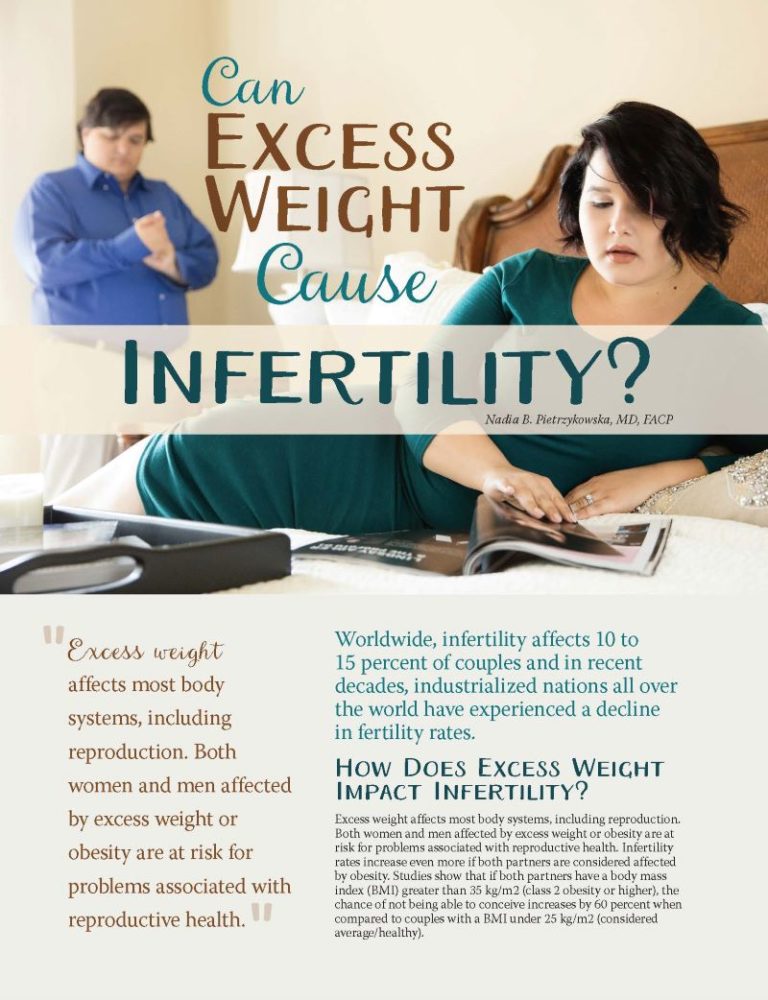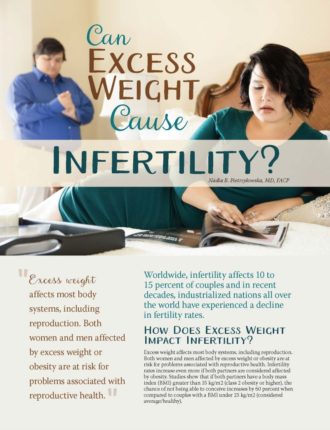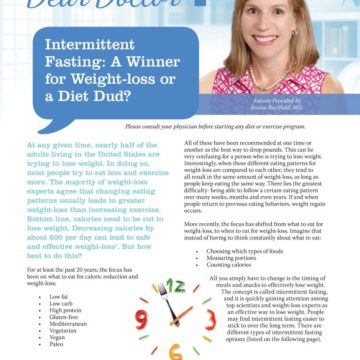Can Excess Weight Cause Infertility?


by Nadia B. Pietrykowska, MD, FACP
Worldwide, infertility affects 10 to 15 percent of couples and in recent decades, industrialized nations all over the world have experienced a decline in fertility rates.
How Does Excess Weight Impact Infertility?
Excess weight affects most body systems, including reproduction. Both women and men affected by excess weight or obesity are at risk for problems associated with reproductive health. Infertility rates increase even more if both partners are considered affected by obesity. Studies show that if both partners have a body mass index (BMI) greater than 35 kg/m2 (class 2 obesity or higher), the chance of not being able to conceive increases by 60 percent when compared to couples with a BMI under 25 kg/m2 (considered average/healthy).
How Does Excess Weight Affect Fertility in Women?
Decreased fertility, increased miscarriage rates and pregnancy complications have been observed in women with a higher BMI, especially above 30 kg/m2 (considered as having obesity). In addition, these outcomes are also worse with assisted conception. This includes lower rates of induced ovulation, less productive egg donation cycles and less successful In Vitro Fertilization (IVF). Lastly, when conception is successful (whether natural or assisted), the risks of pregnancy complications are higher for both mother and baby.
The way obesity affects fertility is complex and involves several factors including:
- Higher Chance of Insulin Resistance – Muscle, fat and liver cells do not respond properly to insulin and can’t easily grab glucose from the bloodstream. As a result, the body needs higher levels of insulin to help glucose enter cells.
- High Insulin Levels – When you eat carbohydrates and your blood sugar rises, your pancreas releases insulin to bring blood sugar levels back to normal. Insulin helps glucose enter your cells so your body can use it for fuel. High insulin levels are a sign of insulin resistance and can lead to problems with glucose control.
- Increased Incidence of Polycystic Ovarian Syndrome – This is a condition in which a woman’s estrogen and progesterone (sex hormones) are out of balance. This leads to the growth of ovarian cysts (benign masses on the ovaries).
- These conditions appear with an abnormal sex hormone balance tipping toward a more androgenic (male) profile. Both high insulin levels and high androgen hormone levels disturb ovulation cycles and decrease fertility.
Women with these conditions tend to have:
- Irregular periods
- Increased abdominal adiposity (body fat)
- Hirsutism (unwanted male-pattern hair growth on a woman’s face, chest and back)
- Skin acne
The hormonal environment allowing for proper ovarian function and successful ovulation is dependent on the balance between several types of hormones. It has been found that leptin, which is a hormone produced by fat tissue, is elevated in women with obesity. This in turn reduces fertility. Studies also show that when ovulation is successful, the egg quality may be poorer and not result in a successful pregnancy.
The next step is successful implantation of the fertilized egg in the endometrium (tissue lining the inner cavity of the uterus or womb). In women with obesity, endometrial development and egg implantation are also poor – even though the exact mechanism is unclear. Finally, when implantation is successful, women with excess weight have a lower chance for successful pregnancy due to higher miscarriage rates.
Women undergoing IVF have poorer outcomes when they are affected by excess fat tissue. They seem to require higher doses of gonadotropins (hormones that stimulate the ovaries to produce oocytes), and IVF results in less eggs available. Some studies also show that the endometrium inside the uterus is not as favorable to embryo implantation as it would be in a woman without excess weight.
Improving Fertility in Women
Many medical societies, including the American Society for Reproductive Medicine, The American Dietetic Association, The American Society for Nutrition and others, recommend that women with excess weight or obesity be provided with assistance to lose weight prior to conception and later to maintain a healthy weight after pregnancy. The Canadian clinical practice guidelines on the management and prevention of obesity in adults and children recommend 5-10 percent weight-loss through lifestyle changes as a first step in treatment. In cases of unsuccessful medical treatment of obesity, bariatric surgery should be considered. This said, pregnancy in the first years after bariatric surgery is discouraged and this should be discussed thoroughly with a bariatric surgeon to determine goals and expectations.
How Does Excess Weight Affect Fertility in Men?
In the last 10 years, we’ve spent more time learning about the impact of a man’s weight on couple’s fertility. As we learn more, it looks like excess weight in males may decrease fertility and embryo health.
Obesity in men contributes to infertility by decreasing sperm count and quality, increasing erectile dysfunction and increasing other physical conditions like sleep apnea, for example. These effects can be more severe if there are additional risk factors present such as:
- Tobacco smoking
- Excessive alcohol intake
These occurrences are complex and not fully understood. It is known that sperm production is regulated by a process involving hormone regulation by several organs in the body. A delicate balance involving certain parts of the brain (hypothalamus and pituitary) and testicular tissue is needed to ensure reproduction. Some studies conclude that this balance is affected by excess weight.
How Do Insulin Levels Affect Hormones?
Just as with women, increased insulin levels and insulin resistance in men may affect sex hormone levels through complex systems. Fat tissue itself plays a role in some of these hormonal processes since it is linked to a higher production of estrogen. Estrogen is a hormone present in both males and females, but with much lower levels present in males. Fat tissue has the ability to increase the amount of estrogen in the human body regardless of gender. So, excess fat tissue may increase these hormone levels in males causing abnormally elevated levels that result in hormonal imbalance affecting fertility.
In addition, men with excess fat tissue may have decreased testosterone levels and experience more fatigue and decreased libido, which may affect reproductive health. Beyond hormonal regulation of fertility in males, IVF studies have also shown that sperm from males with obesity appear to have a lesser ability to bind to female eggs and can cause lower rates of fertilization.
Another theory attempting to explain decreased male fertility in individuals affected by excess weight is the possibility of increased scrotal temperature due to excess weight and fat tissue. Because sperm production is highly sensitive to temperature, some scientists think that this may be another contributing factor to decreased fertility.
Improving Fertility in Men and Couples
Improving fertility in males through lifestyle changes and weight-loss has been demonstrated in studies. This said, proper nutrition is also important as malnutrition and drastic weight-loss in the short term may result in decreased fertility. The timing of weight-loss efforts and conception needs to be discussed with a healthcare professional.
Additionally, a couple’s mental health must not be underestimated. Both infertility and obesity are associated with higher rates of depression. Recognizing, diagnosing and treating depression or milder mood disorders help treat both obesity and infertility.
Conclusion
Fertility in couples affected by excess weight or obesity is a complex process. Both men and women play a significant role in a couple’s ability to conceive a child, so it’s important to take gradual steps toward a healthier weight and lifestyle. Remember, weight-loss of just 5 to 10 percent can produce incredible results – so don’t ever be discouraged! If you and your partner are searching for safe and sound solutions for improving couple fertility, discuss these matters with a health professional. There are different options available to you, so don’t be afraid to look for help!
About the Author:
Nadia B. Pietrzykowska, MD, FACP, is a Board Certified and Fellowship trained Obesity Medicine and Nutrition Physician Specialist. She has a primary specialty in Internal Medicine. She is the Founder and Medical Director of “Weight & Life MD”, a Center dedicated to Medical Weight Management and Lifestyle located in New Jersey. Dr. Pietrzykowska has been involved in the Obesity Action Coalition for several years helping to educate both patients and physicians. She strongly believes in personalized as well as long-term approaches to treating the chronic disease of obesity and its comorbid conditions.
by Sarah Ro, MD; and Young Whang, MD, PhD Fall 2023 Mary, a postmenopausal woman with a…
Read Articleby Rachel Engelhart, RD; Kelly Donahue, PhD; and Renu Mansukhani, MD Summer 2023 Welcome to the first…
Read Articleby Sarah Bramblette, MSHL Summer 2023 In the final months of 2022, I experienced both the worst…
Read Article










